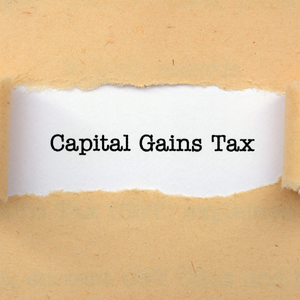
After selling your Fort Worth home, you might feel great, especially with property values skyrocketing lately. But before you start spending that profit, let’s talk about capital gains tax after selling a house in Fort Worth, TX. The good news is it’s not as scary as it sounds—Texas is tax-friendly for homeowners, and many sellers end up paying nothing thanks to generous exemptions.
What is Capital Gains Tax?
Capital gains tax is what you pay on the profit from selling stuff that has increased in value. Like stocks or that vintage baseball card collection, your Fort Worth house counts.
It’s the difference between what you paid for your house and what you sold it for.
Let’s say you bought your place for $200,000 and sold it for $350,000. Your capital gain is $150,000, which might be taxed.
However, the government wants people to own homes, creating generous breaks for people selling their main house.
What do you need to know? You’re only paying taxes on your profit, not the wholesale price. So in our example, you’re not paying taxes on that full $350,000. Just the $150,000 profit, and even then, you might not owe anything at all.
Federal Tax vs. State Tax: How Texas Differs

Texas makes life easier in one huge way: absolutely zero state capital gains tax. While your buddies in California might pay up to 13.3% in state taxes on top of federal ones, you can skip that entirely.
Capital Gains Tax after selling a House in Fort Worth, TX, only involves dealing with Uncle Sam, not the state.
This puts Fort Worth in an elite club with Alaska, Florida, Nevada, New Hampshire, South Dakota, Tennessee, and Wyoming.
If you don’t qualify for exemptions, you’ll still deal with federal taxes, but federal rates are way more reasonable. This is usually 0%, 15%, or 20%, depending on your income.
Texas achieved this through Proposition 4, which requires voters to approve any personal state income tax. Since capital gains count as income, they’re also protected.
When selling your Fort Worth home, you only have to worry about one tax agency: the IRS. This is way simpler than juggling both federal and state taxes, especially when you have Southern Hills Home Buyers guiding you through the process.
Types of Capital Gains When Selling Your Home
There are two flavors of capital gains, and you want to know the difference because it can affect your wallet heavily.
Short-Term Capital Gains
Short-term capital gains are the government’s way of saying slow down. If you sell your Fort Worth house within a year of buying it, these gains get taxed like regular income.
That means whatever tax bracket you’re in for your job, that’s what you’ll pay on your house profit, too.
This can sting pretty hard. If you’re making good money and fall into the 32% tax bracket, that’s what you’ll pay on your house gains.
Long-Term Capital Gains
Long-term capital gains are where the tax code gets friendly with homeowners. Once you’ve owned your Fort Worth place for over a year, you qualify for these much better rates.
Depending on your income level, we’re looking at 0%, 15%, or 20%. If you’re single and making under $47,025 (or married filing jointly under $94,050), you hit the jackpot with 0% tax.
How Much Is The Capital Gains Tax After Selling a House in Fort Worth, TX
Thanks to that exemption, most Fort Worth homeowners who sell their primary residence don’t pay any capital gains tax.
Single homeowners can exclude up to $250,000 in profit, while married couples get $500,000. That covers most home sales in our area.
But let’s say you made more profit than the exemption covers, or you’re selling a rental property. Then you’re looking at those long-term rates: 0%, 15%, or 20%, depending on your income.
For a typical middle-class family, that’s usually 15% on whatever profit exceeds the exemption amount.
After selling a house in Fort Worth, TX, the Capital Gains Tax is trickier with investment properties since they don’t qualify for the primary residence exemption. But even then, you only deal with federal taxes, not state ones. Plus, strategies like 1031 exchanges can help investors defer taxes completely.
How to Qualify for the $250,000/$500,000 Exemption
It’s way easier to qualify for this exemption than most people think. You just need to check a few boxes, and you could save thousands in taxes.
The IRS calls this the primary residence exemption, but we just call it awesome.
First, the house needs to be your main home, not a vacation spot or rental property. You must have owned it for at least two years out of the last five years before selling.
Those two years don’t have to be back-to-back. You could have moved out for a year and moved back in, and you’d still qualify.
The last significant rule is that you can’t have used this exemption on another house sale in the past two years. The government’s generous, but they’re not stupid.
They don’t want people tricking the system by flipping exemptions every year. Once every two years is the limit for Capital Gains Tax after selling a House in Fort Worth, TX, with exemptions.
How to Calculate Your Capital Gains Tax Liability
Calculating capital gains may sound intimidating, but it’s just fourth-grade math with bigger numbers.
You can start with the price you sold your Fort Worth house for and subtract the original price. That difference is your capital gain. Oops. You’re not done yet because you can add stuff to reduce that number.
You can tack on the cost of significant improvements you made over the years. Yes, include that new roof and kitchen renovation. Fresh paint? Nope, that doesn’t count.
We’re talking about big stuff that adds real value. Keep those receipts because the IRS loves paperwork.
Don’t forget about selling costs either. Real estate professional commissions, closing costs, and legal fees subtract from your gain. Once you’ve got your final number, apply the exemption if you qualify, then multiply whatever’s left by your tax rate. If you’re unsure how things like state or local charges might factor in, using an excise tax calculator can also help estimate any additional taxes owed from the sale.
Most Fort Worth folks owe zero after running through this process.
Rental Property Capital Gains in Fort Worth

Rental properties are a whole different thing when it comes to taxes. You don’t get that primary residence exemption we mentioned earlier, meaning every dollar of profit is potentially taxable.
But no need to panic. There are still ways to work the system legally and keep more money in your bank.
The big difference is that rental properties are also hit with depreciation recapture. Remember all those years you claimed depreciation on your taxes? Well, the government wants some of that back when you sell.
It’s taxed as regular income up to 25%, which can sting more than capital gains rates.
Capital Gains Tax after selling a house in Fort Worth, TX. Rental properties still benefit from Texas’s no state taxes, though.
You’re only dealing with federal taxes. Strategies like 1031 exchanges can help you defer everything if you’re buying another rental property.
Second Home Sales and How They Affect Taxes
Those second homes don’t qualify for the primary residence exemption but are not as complicated as rental properties.
So if you own a lake house or a vacation spot, you’ll pay regular capital gains rates on your profit, which is 0%, 15%, or 20%, depending on your income level.
The trick with second homes is timing and planning. If you’re considering making your second home your primary residence, you could qualify for that exemption down the road.
You’d need to live there for two out of five years before selling, but it could save you serious cash.
Some homeowners convert their second home to a rental property, then do a 1031 exchange. It’s legal, but it’s also complicated enough that you’ll want to chat with a tax pro before trying anything fancy.
Capital Gains Tax after selling a house in Fort Worth, TX, and second homes can be very stressful if you’re not careful.
Top Strategies to Minimize Capital Gains Tax When Selling
Smart Fort Worth homeowners know there are plenty of legal workarounds to slash their tax bill. These strategies aren’t just for rich people, either. Regular home sellers can use most of them with a bit of planning.
Tip #1: Use Section 1031 Exchange for Investment Properties
A 1031 exchange lets you sell one investment property and buy another without paying capital gains tax immediately.
The catch? You’ve got strict deadlines. We’re talking days to identify potential replacement properties and 180 days to close. This only works for investment properties, too, not your primary home.
Tip #2: Time Your Sale for Optimal Tax Benefits
Timing is everything in taxes. If you’re close to qualifying for that primary residence exemption, it might be worth waiting a few extra months to hit that two-year mark.
If you have a big income year coming up, maybe wait until next year when you’ll be in a lower tax bracket.
You can also time it around retirement when you might get to that 0% capital gains rate territory.
Tip #3: Use Capital Losses to Offset Gains
If you lost money on some stocks or another property, those losses can help reduce your tax bill on your Fort Worth home sale.
The IRS lets you use capital losses to offset capital gains dollar for dollar. You can even carry forward losses from previous years if you haven’t used them all yet.
Just stick to legitimate losses since the IRS has seen every sketchy trick in the book.
Do Rising Property Values Have an Impact on Taxes?
Fort Worth’s real estate market has been quite bonkers lately, which is incredible for your bank account but potentially rough for your tax bill.
Houses that sold for $200,000 a few years ago now cost $350,000. That’s outstanding equity, but it could also mean bigger capital gains when you sell.
But (yes, there’s a but!), most people still stay under that $250,000/$500,000 exemption threshold even with all this appreciation. Fort Worth isn’t quite at California or New York price levels, where regular people routinely exceed those limits. But it’s getting closer, especially in the nicer neighborhoods.
If you bought your house years ago for cheap and it’s now worth serious money, start planning now.
After selling a house in Fort Worth, TX, the Capital Gains Tax becomes bigger when your profits exceed those exemption limits.
Pro Tip: Talk to a tax pro about strategies before you list your house, not after you’ve already sold it.
Reporting Requirements for Federal Tax
The IRS wants to know about your home sale, but don’t be nervous. It’s not as difficult as filing your regular taxes.
You might not need to report anything if you qualify for that primary residence exemption and your gain is completely covered. But you’ll need to file some paperwork if you owe taxes or your sale price was over $250,000 ($500,000 for married couples).
You’ll use Form 8949 to report the details of your sale and then transfer that information to Schedule D on your main tax return.
Keep all your records handy at all times, including purchase price, improvement costs, selling expenses, and dates.
The IRS loves documentation, and you don’t want to scramble for receipts if they come knocking.
Capital Gains Tax after selling a house in Fort Worth, TX, reporting gets easier when you stay organized throughout the whole process, especially if you choose to sell your home for cash in Garland or nearby cities for a faster, simplified transaction.
Exceptional Circumstances in Fort Worth Real Estate
Fort Worth homeowners deal with divorce, inheritance, military moves, and other life changes that can make the capital gains picture quite messy. However, the IRS has considered most of these scenarios and created some helpful rules.
Inherited Property and Stepped-Up Basis
Getting a house through inheritance is bittersweet, but at least the tax situation is quite nice.
When you inherit property, you get a “stepped-up basis,” which means the IRS pretends you bought the house for whatever it was worth when the original owner died. This can save you massive amounts in capital gains tax.
Let’s say your grandparents bought their Fort Worth house for $50,000 in the past, and it’s worth $300,000 now. They’d owe taxes on $250,000 in gains if they sold it.
But if you inherit it and sell it right away, you’d owe taxes on zero gains because your basis stepped up to that $300,000 value, making it a great opportunity to sell your home for cash in Fort Worth or nearby cities without a tax hit.
Estate Tax Considerations in Texas
As mentioned, Texas doesn’t have its estate tax, another win for Fort Worth families dealing with inheritance.
You only need to worry about federal estate taxes, which don’t occur unless the estate is worth over $13 million.
So, unless your family is seriously loaded, estate taxes probably aren’t an issue when inheriting property.
Divorce and Property Division Tax Implications

Divorce is messy enough without worrying about taxes, but here’s some decent news: transferring property between spouses during a divorce usually doesn’t trigger capital gains tax.
The receiving spouse gets the same basis as the original owner, so the tax bill is passed along rather than due immediately.
The tricky part comes later when the house gets sold. If you end up with the family home in the divorce, you can still use that primary residence exemption if you meet the ownership and residence requirements.
Capital Gains Tax after selling a house in Fort Worth, TX, divorce situations might be complicated, so definitely chat with both a divorce attorney and a tax pro.
Work with Cash Buyers Now!
Cash buyers can be your best bet when you’re trying to minimize your tax headaches. These investors buy houses fast, usually in one to two weeks. This will give you way more control over when your sale happens.
That timing control can be huge for tax planning. Maybe you want to close this year, or waiting until January makes more sense for your tax situation.
Cash buyers don’t care about your house’s condition, so you can skip expensive repairs that might not even help your tax situation.
They’ve seen everything so that they won’t hate on your fixer-upper. They just run the numbers and make an offer based on what they can do with the property.
After selling a house in Fort Worth, TX, the Capital Gains Tax can be way simpler with cash buyers because there’s less uncertainty. You know exactly when you’re closing, exactly how much you’re getting, and you can plan your taxes accordingly!
Key Takeaways: Capital Gains Tax After Selling a House in Fort Worth, TX
Selling a house in Texas is less stressful financially because you won’t be charged any state capital gains tax. You only deal with federal taxes.
Most Fort Worth homeowners selling their primary residence won’t owe anything thanks to the $250,000/$500,000 exemption. Even if you do owe taxes, the rates are usually pretty reasonable at 0%, 15%, or 20%.
But if you want to skip the hassle of traditional sales and need to sell your Fort Worth house fast, check us out at Southern Hills Home Buyers. We buy houses in any condition and can close quickly. We can give you complete control over your tax timing. Contact us at (214) 225-3042 to get a no-obligation cash offer. Take the stress out of selling your home TODAY!
| LEVY | TAXED | FORT WORTH | TEXAN | MORTGAGES | MORTGAGE LENDERS |
| APPRAISALS | REAL ESTATE PRICES | CAPITAL GAINS TAXES | HOMEOWNERSHIP | COMPARATIVE MARKET ANALYSES | TAX RATE |
| OPTIONS | INCOME | ECONOMY | PRICING STRATEGY | POPULATION GROWTH | |
| PERSONAL FINANCE | NEGATIVE EQUITY | MARKETING | INVESTORS | GIFT | FORECLOSURE |
| ESCROW ACCOUNT | ASSET | SHORT SALE | REMODELING | REASONS | MONEY |
| MARKET ANALYSES | LIABILITIES | JOB MARKET | LABOR MARKET | INFORMATION | INCENTIVE |
| HOME EQUITY LOAN | GIFT TAX | ECONOMIC TRENDS | DEPRECIATE | CREDIT | CONFIDENCE |
| COMPANY | BUDGET | ATTENTION | ISLANDSOUTH CAROLINASOUTH DAKOTATENNESSEETEXASUTAHUS | YOUR HOMES VALUE | DAKOTATENNESSEETEXASUTAHUS VIRGIN ISLANDSVERMONTVIRGINIAWASHINGTONWEST |
| CLOSING COSTS AND | CAROLINASOUTH DAKOTATENNESSEETEXASUTAHUS VIRGIN | THE REAL ESTATE | IN TODAYS MARKET | RICORHODE ISLANDSOUTH CAROLINASOUTH DAKOTATENNESSEETEXASUTAHUS | TODAY PROPERTY ADDRESS STREET |
| PROPERTY ADDRESS STREET ADDRESS | IN THE REAL ESTATE | DAKOTATENNESSEETEXASUTAHUS VIRGIN ISLANDSVERMONTVIRGINIAWASHINGTONWEST VIRGINIAWISCONSINWYOMINGARMED | CAROLINASOUTH DAKOTATENNESSEETEXASUTAHUS VIRGIN ISLANDSVERMONTVIRGINIAWASHINGTONWEST | CASH OFFER FOR YOUR | ISLANDSOUTH CAROLINASOUTH DAKOTATENNESSEETEXASUTAHUS VIRGIN |
| ZIP CODE PHONE EMAIL | INFO ON OPTIONS TO | MARKET CAN BE CONFUSING | MORE INFO ON OPTIONS | TODAYS MARKET CAN BE | OPTIONS TO SELL YOUR |
| IN TODAYS MARKET CAN | PROPERTY IN TODAYS MARKET | SELLING A PROPERTY IN | HOME SELLING A PROPERTY | YOU THROUGH YOUR OPTIONS | A PROPERTY IN TODAYS |
| ON OPTIONS TO SELL | THE REAL ESTATE MARKET |
Helpful Fort Worth Blog Articles
- Is Fort Worth, TX, a Good Place to Live?
- Worst Neighborhoods In Fort Worth, TX
- What Happens if an Appraisal Comes in Low in Fort Worth, TX?
- How To Avoid A House Foreclosure In Fort Worth, TX
- Fun Facts About Fort Worth, TX
- How To Sell An Inherited House In Fort Worth, TX
- Selling My House On My Own In Fort Worth, TX
- Selling a House in Bad Condition in Fort Worth, Texas
- Capital Gains Tax After Selling a House in Fort Worth, TX
- How Long Does an Eviction Process Take in Fort Worth, TX
- Contingencies on Selling A House in Fort Worth, Texas
- Selling Your Elderly Parents’ Home in Fort Worth, TX
- Sell a House As Is Without Inspection in Fort Worth, TX

